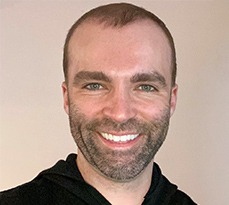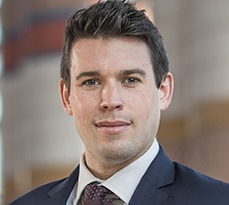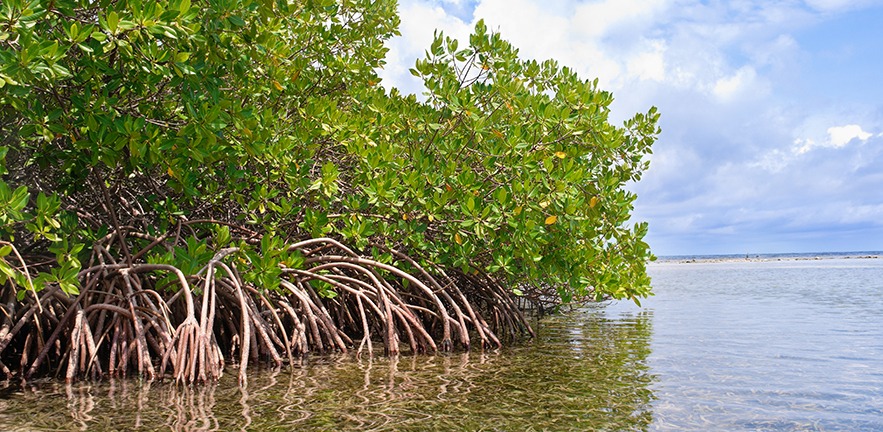The winners of the 2022 Kellogg-Morgan Stanley Sustainable Investing Challenge, John Ambler (MBA 2021) and William Maxted (MBA 2021), talk mangrove forests, improving people’s lives, and team spirit on the Cambridge MBA programme.
Hurricane Matthew’s effect on a coastal conservationist

John Ambler was working in the Bahamas in coastal conservation when Hurricane Matthew struck in October 2015. The Category 4 hurricane brought two days of battering winds and torrential rain to the island and experiencing the devastation first-hand was “a huge moment in my career and environmental journey,” he says. It was also an opportunity to see how mangrove forests could prevent erosion and absorb storm surges, protecting local communities.
When John later joined the Cambridge MBA programme in 2021, he struck up a friendship with William Maxted, and despite radically different career paths they quickly identified a shared interest in mangroves.
Combining skills with a former member of the Parachute Regiment

William’s background is in the British military, serving in the Parachute Regiment, which involved jumping from the doors of a C-130 aircraft at 800 feet travelling at more than 100mph. The 31-year-old then worked in finance, specialising in climate risk and climate mitigation solutions. This led him to look at mangroves as a nature-based solution to combat climate change.
“Will and I both had incredibly similar ideas independently of one another, each coming from different angles – myself from carbon offsetting and Will from insurance,” says John, age 29, who hails from Maine in the US. “We got talking about trying to use eco-systems, in this case mangroves, for financial and social benefits.”
Protecting mangrove forests from climate change
In April 2022 this vision led to them coming top out of 77 teams to win this year’s Kellogg-Morgan Stanley Sustainable Investing Challenge, by creating a new type of insurance to protect and restore mangrove forests affected by climate change. Coast Haven Brokerage is a platform-based brokerage that uses data capturing and parametric insurance. The project connects those benefitting from the rich ecosystems of mangroves – such as tourism industries and governments – with insurers, investors, project developers and restoration experts. When winds reach specific speeds in at-risk areas, signalling an extreme weather event, insurers would immediately make fixed-rate payments to allow rapid regeneration, helping to ensure the protection of mangrove forests and their communities.
The Kellogg-Morgan Stanley Sustainable Investing Challenge sees competitors addressing global environmental and social issues using innovative financial solutions. Run by the Morgan Stanley Institute for Sustainable Investing and Kellogg School of Management at Northwestern University, this year’s challenge was the 12th such event.
The value of support from MBA classmates
The pair were aware of the award before they started at CJBS and put the entry together themselves utilising their industry experience. John was also able to draw on his knowledge developing and managing carbon offsetting projects in East Africa. Much of this year’s challenge was held remotely, and both found the support of their MBA classmates invaluable.
“A lot of our fellow students were very generous with their time, in terms of listening to the pitch, giving feedback,” says John. “We are grateful to everyone who was able to do that,” added William. “It definitely got us over the finishing line in terms of clarifying and condensing what we were trying to do.”
How to be sustainable while also providing value to investors
More than 250 graduate students from 35 different countries pitched solutions in the competition, with 16 teams making it through to the finals on 8 April. It seems the win didn’t come as a complete surprise for the two as the further they got, the more positive the feedback became, and the more winning seemed a possibility. “We both just felt it was a really good idea that could provide value to investors, as well as tangibly and completely improving people’s lives,” explains John. “We believe in the idea beyond the scope of the presentation and the competition.”
A second award for best investment in emerging economies
Their success has continued with the pair recently coming in the top three at Imperial College Business School’s Climate Investment Challenge. They also won the £7500 Emerging Markets Prize for the best investment focused on emerging economies. For this competition, John and William demonstrated how they would operationalise their idea into a business.
“Due to the nature of the prize, we thought hard about how creating a platform to protect and restore mangrove forests would have positive impacts for developing communities, re-risking them for investment and growth in an increasingly uncertain world”, says William.
Post-MBA: an opportunity for more nature-based climate solutions
Both expect to graduate the MBA programme in the summer,and it’s likely they will invest their winnings in moving the idea forward. While mangroves remain the immediate focus, providing other nature-based climate solutions is a future goal. The connections they have formed with industry experts, judges, and other competitors will be key. “It gave us the opportunity to run the idea past a bunch of smart people who aren’t friends or will tell us nice things,” says John. “That’s a real value that comes from being in the MBA – being in a position where people will share their time with you if you’re not in the industry. We’re excited to pursue this project further now.”


